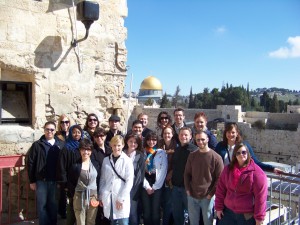Israel Reflections & Lessons: The Cycle of Violence & Fear
In the next few days, I will post several blogs compiled of postings from my students who were asked this week to reflect on what they learned from the trip to Israel (earlier posts on our trip can be found on the blog starting here). I’ll start tonight with third-year student Katie Bricco’s overall take on the trip and understanding of the “other”:
We had the opportunity to meet some extremely bright and influential people in the Israel-Palestinian debate. When I think back to the speakers we heard from, my mind turns to the three Arab men that we met. [Ed. note–We met with Justice Joubron of the Israeli Supreme Court, Ali from the Parent’s Circle, and Youssef Jabareen from the Arab Center for Law & Policy.] Many of the Israelis (Jews) that we met were committed to the concept of peace and, likewise, were very open minded and tried to present fair assessments of how the conflict affects everyone involved. I felt that I got a very good sense of the conflict from the Israeli perspective, but we often got the Palestinian and Arab Israeli perspective through the lens of an Israeli Jew. There was something about hearing these concerns from people within the affected community that made me want to pay attention. For me, understanding the human rights concerns that the Arab population in Israel faces helps me to understand a facet of war that I have never been able to relate to.
Essentially, Israeli (Jews) are concerned about safety.

